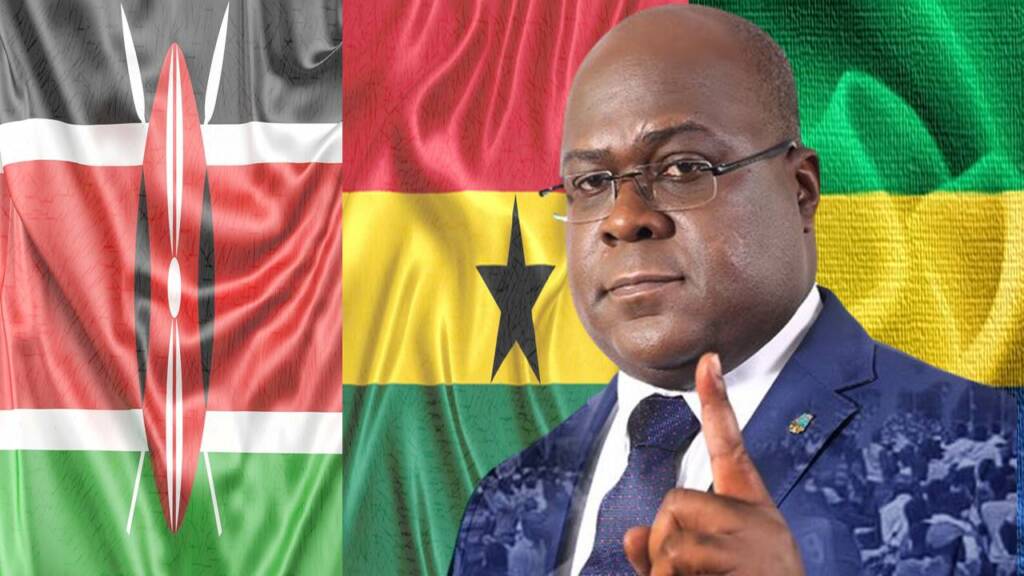Africa 3 members of UNSC: In a recent development of events, Rwanda’s ambassador to Kinshasa has been expelled by the Democratic Republic of the Congo as the M23 rebels seize control of two cities. Rwandan authorities are keeping an eye on the situation in the eastern DRC and accuse President Felix Tshisekedi of collaborating with rebels who are hostile to Paul Kagame. Rwanda asserts that shortcomings in DRC’s security and governance are to be blamed for a recent rebel assault and not Rwanda.
M23 rebel fighters took over the town of Kiwandja in eastern Congo on Saturday, completely cutting off Goma, the capital of North Kivu, from the province’s upper half. According to the locals, the Congolese army unit that had been guarding the town had left a day before. Recently, the army has strategically retreated from inhabited regions to keep conflict away from cities and safeguard civilians.
After the army and the M23 militants resumed fighting, unrest in North Kivu shattered months of relative stability in eastern Congo. Congo accuses its neighbor Rwanda of aiding the M23 insurgents, although Rwanda denies this. Since violence resumed on October 20, army forces have engaged rebel militants several times, resulting in the deaths of at least four civilians. According to United Nations the violence has forced about 23000 people to flee from the region. There are accusations from both sides on the other for initiating the conflict.
As the M23 rebels seize control of two cities, the Democratic Republic of the Congo has dismissed Rwanda’s representative to Kinshasa accusing Rwanda of facilitating the rebels. Rwanda in turn blames President Felix Tshisekedi of collaborating with rebels opposed to Paul Kagame in Rwanda. The declaration was issued by the government’s spokesperson, Patrick Muyaya, following a meeting of the administration to review the security situation in the Democratic Republic of the Congo. The UN peacekeeping mission there raised its “troop alert level” in response to the most recent rebel fighter advance and increased support for the army.
The Africa 3 members corner US in United Nations
Kenya, Gabon, and Ghana, the three African nations that make up the UN Security Council’s (UNSC) “A3” group, have requested an urgent meeting to discuss the recent escalation of armed violence in the Democratic Republic of the Congo’s (DRC) eastern region.
These nations outlined three issues and demanded resolution regarding three areas:-
- The threat of Armed insurgent groups
- Illegal exploitation of resources
- Confidence building among regional leaders
An armed confrontation was reported in Rutshuru, a town in the northern Kivu region, on October 20. As government forces engaged M23 insurgents, ten people lost their lives and many more were hurt. Martin Kimani, Permanent Representative of the Republic of Kenya to the United Nations, spoke on behalf of the three nations and outlined three areas that demand immediate attention in order to resolve the conflict’s underlying causes.
Also Read: US wants to choke the DRC’s sprawling energy sector to keep M23 rebels afloat
Armed insurgent groups
Alongwith Rwanda-backed M23 there are many insurgent groups operating in the region. The Allied Democratic Forces (ADF) operates in the border region of DRC and Rwanda and it has Islamist extremist links. Another significant group in the area is the Democratic Forces for the Liberation of Rwanda (FDLR), which was formed by Hutu rebels in Rwanda. Then there is Red Tabara, which has connections to Burundi, and the Cooperative for Development of the Congo (Codeco), a loose coalition of different armed organizations. These organisations are engaged in serious human rights violations and mass murder. Some of these organisations, like the ADF, have ties to terrorist organisations like ISIS.
Resources
Gold, tungsten, tantalum, and other minerals are abundant in the eastern DRC. More than 50% of the mines in eastern Congo are run by different rebel and militia groups. Along with these resources Cobalt is also abundant in the DRC. 70% of the cobalt reserves in the world are found here, which are used in numerous components including batteries and cells. Some of these insurgent groups are supported by Rwanda that assist the smuggling of cobalt and other natural resources into Rwanda and other nearby regions. M23 was once chased out by DRC forces and the UN peacekeeping force, but afterwards they recovered and took over certain locations in the northeastern region of the country. However, the nations of central Africa are coming together to aid the DRC in putting an end to this threat.
Read More: DRC urgently needs to kick UN and US out to bring peace in the region and eliminate M23 menace
Cooperation between Regional leaders
Although Kenya and other EAC nations have come together to end the rebellion groups’ menace, but the political will to confront these rebels is still lacking in some nations. The talks between the DRC and Rwanda leaders will be held from 4 to 13 November under the EAC. To end the conflict in DRC, former President Uhuru Kenyatta will facilitate the third Inter-Congolese Dialogue.
The Pentagon is perturbed after seeing this type of leadership and unity between the Africa 3 members of UNSC. These nations are not directly connected to the conflict but are there with DRC to end this menace and subsequent conflicts destabilizing the region. Kenya, Gabon, and Ghana together have played the US into their hands as they have given America a literal schooling in its den ‘UNSC’. The US should now understand that its days are over in the African continent as the nations have realized the real motive of American presence in the continent and they will now foil any illicit charm offensive of the US.
https://www.youtube.com/watch?v=9GUFdNvhUN0&t=1s
